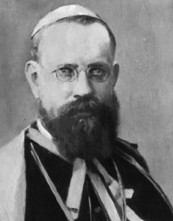Franz Xaver Geyer
Franz Xaver Geyer (born December 3, 1859 in Regen ; † April 2, 1943 in Banz Monastery ) was a German Catholic missionary in Sudan , mission bishop of Central Africa and a writer.
Live and act
He was born the son of journeyman carpenter Michael Geyer (also Geier) and his wife Maria in the Weiler Wieshof, which belongs to Regen. From 1872 he was taught in the episcopal boys' seminar St. Max and at the humanistic grammar school in Passau . After graduating from high school there, he studied theology and law at the University of Munich . In 1880 he joined the African Missionary Institute of St. Daniele Comboni in Verona ; The nucleus of today's Comboni missionaries .
After his ordination in Verona on September 23, 1882, Geyer went to Khartoum as a missionary . Shortly before his arrival, a fundamentalist Islamic movement known as Mahdism had conquered all of Comboni's mission stations in Sudan, with the exception of Khartoum itself. 15 priests as well as several lay missionaries and religious sisters were taken prisoner and the city of Khartoum was already threatened. Daniele Comboni's first successor, Bishop Francesco Sogaro, immediately took Geyer with him to Khartoum and commissioned him to devise ways of freeing the prisoners, which some actually succeeded in doing. In January 1884, the Mahdists also conquered Khartoum, with Franz Xaver Geyer organizing the evacuation of the eight remaining missionaries and about a hundred local Christians. For them, a site was later acquired on the outskirts of Cairo on the Nile island of Gezira and a settlement was built, which was called the " Anti-Slavery Colony Leo XIII. "
From then on, the Bavarian priest acted as the deputy of Bishop Sogaro, who could not reside in his episcopal city of Khartoum, but had to live in Cairo. He was also the pastor of Aswan , later of Suakin on the Red Sea, and in 1891 he became provicer of the mission area.
In 1895 a German-speaking mission house of the Comboni missionaries was founded in Brixen , which Geyer took over in 1897 and held until 1903. During this time he built the Brixen Xaverianum (today Jakob-Steiner-Haus) as the domicile of the branch .
On August 6, 1903, Pope Pius X appointed Franz Xaver Geyer as Apostolic Vicar of Central Africa (from 1913 Apostolic Vicariate Khartoum) and Titular Bishop of Trocmades ; Archbishop Stein consecrated him on November 9, 1903 in Munich's Liebfrauendom . He was the first bishop appointed by the new Pope Pius X and has now returned to Khartoum as head of mission. Geyer was able to preach in German, English, Italian, French and Arabic. With his own energy and diplomacy he was able to set up a number of mission stations in Sudan and northern Uganda. Several times he spent months on difficult and dangerous mission trips, on which he was often accompanied by his compatriot Father Otto Huber from the Palatinate and Bavaria . In 1921 Geyer resigned from his episcopal office because after the First World War he was not wanted as a German in his mission area.
When he returned home, he began his project in 1922 to found an institution for the training of priests for German Catholics abroad. A first step was the establishment of the "German Priesthood Abroad" in Bad Godesberg. Two years later, the Community of the Holy Angels was founded for pastoral care and mission in Germany . As the house in Bad Godesberg subsequently became too small, Geyer moved the mission institution to Banz Castle near Lichtenfels .
Geyer founded the three mission magazines Stern der Neger (1898), the quarterly "Deutsche Auslandsseelsorge" (1927) and the successor magazine "Jahrbuch" (1933). In addition to his missionary work, Geyer wrote several books, especially about his missionary trips. Since 1883 he was an honorary member of the Catholic-German student union "Aenania" in Munich in the CV, which had been founded in 1851 by Franz Lorenz Gerbl, a later Sudan missionary. His hometown of Regen made him an honorary citizen on October 11, 1912, and a street there is named after him.
Geyer's best-known book "Through sand, swamp and forest: Missionsreisen in Zentral-Afrika" , published in 1912, was reprinted in 2011 ( ISBN 1178476065 ).
See also
literature
- Paul Juchem: Bishop Franz Geyer, his life and work , Herder, Freiburg 1939.
- Hans Vogl: A great son of the city , newspaper article in Passauer Neue Presse from February 10, 2010; Digital scan
- Hans Vogl: Bischofs-Haus through the ages (on the birthplace of Bishop Geyer), newspaper article in Passauer Neue Presse from June 3, 2010; Digital scan
Web links
- Biographical website about Bishop Franz Xaver Geyer
- Franz Xaver Geyer in RegioWiki Niederbayern
- Webpage about the history of the Comboni missionaries in Sudan, with a picture of Bishop Geyer
- Franz Xaver Geyer in the portal "Catholic Hierarchy"
Individual evidence
- ^ Website on the history of the Comboni missionaries
- ↑ Website on the former Xaverianum in Brixen ( Memento from June 15, 2012 in the Internet Archive )
- ^ Website on the appointment of bishops
- ↑ To the new edition of the book
| personal data | |
|---|---|
| SURNAME | Geyer, Franz Xaver |
| BRIEF DESCRIPTION | German mission bishop |
| DATE OF BIRTH | December 3, 1859 |
| PLACE OF BIRTH | rain |
| DATE OF DEATH | April 2, 1943 |
| Place of death | Banz Monastery |

